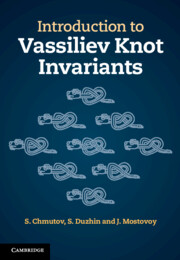Book contents
- Frontmatter
- Contents
- Preface
- 1 Knots and their relatives
- 2 Knot invariants
- 3 Finite type invariants
- 4 Chord diagrams
- 5 Jacobi diagrams
- 6 Lie algebra weight systems
- 7 Algebra of 3-graphs
- 8 The Kontsevich integral
- 9 Framed knots and cabling operations
- 10 The Drinfeld associator
- 11 The Kontsevich integral: advanced features
- 12 Braids and string links
- 13 Gauss diagrams
- 14 Miscellany
- 15 The space of all knots
- Appendix
- References
- Notations
- Index
10 - The Drinfeld associator
Published online by Cambridge University Press: 05 June 2012
- Frontmatter
- Contents
- Preface
- 1 Knots and their relatives
- 2 Knot invariants
- 3 Finite type invariants
- 4 Chord diagrams
- 5 Jacobi diagrams
- 6 Lie algebra weight systems
- 7 Algebra of 3-graphs
- 8 The Kontsevich integral
- 9 Framed knots and cabling operations
- 10 The Drinfeld associator
- 11 The Kontsevich integral: advanced features
- 12 Braids and string links
- 13 Gauss diagrams
- 14 Miscellany
- 15 The space of all knots
- Appendix
- References
- Notations
- Index
Summary
In this chapter we give the details of the combinatorial construction for the Kontsevich integral. The main ingredient of this construction is the power series known as the Drinfeld associator ΦKZ. Here the subscript “KZ” indicates that the associator comes from the solutions to the Knizhnik-Zamolodchikov equation. The Drinfeld associator enters the theory as a (normalized) Kontsevich integral for a special tangle without crossings, which is the simplest associating tangle.
The associator ΦKZ is an infinite series in two non-commuting variables whose coefficients are combinations of multiple zeta values. In the construction of the Kontsevich integral only some properties of ΦKZ are used; adopting them as axioms, we arrive at the general notion of an associator that appeared in Drinfeld's papers (1989, 1990) in his study of quasi-Hopf algebras. These axioms actually describe a large collection of associators belonging to the completed algebra of chord diagrams on three strands. Some of these associators have rational coefficients, and this implies the rationality of the Kontsevich integral.
The KZ equation and iterated integrals
In this section, we give the original Drinfeld's definition of the associator in terms of the solutions of the simplest Knizhnik–Zamolodchikov equation.
The Knizhnik–Zamolodchikov (KZ) equation appears in the Wess–Zumino–Witten model of conformal field theory (Knizhnik and Zamolodchikov 1984). The theory of KZ type equations has been developed in the contexts of mathematical physics, representation theory and topology (Etingof et al. 1998; Varchenko 2003; Kassel 1995; Kohno 2002; and Ohtsuki 2002).
Information
- Type
- Chapter
- Information
- Introduction to Vassiliev Knot Invariants , pp. 265 - 309Publisher: Cambridge University PressPrint publication year: 2012
